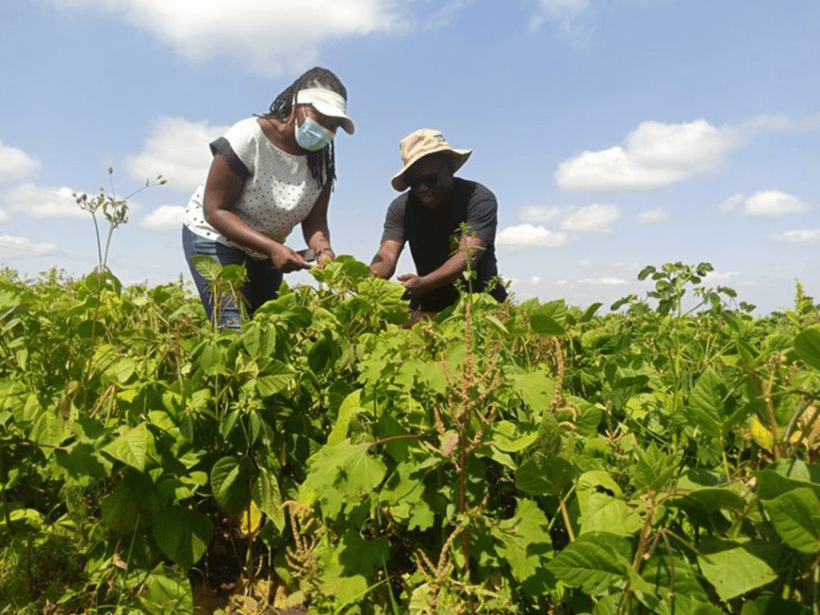
2019 One Planet Laureate Candidate Miriam Karwitha (on the left) examines crops on a farm
Over the years, climate change has evolved from an environmental problem to a significant development challenge whose impact ripples across all economic sectors. Climate change’s adverse effects on agriculture have adversely affected developing countries, particularly those in sub-Saharan Africa, and Kenya is no exception. According to the Kenya Climate-Smart Agriculture Strategy – 2017-2026, the agricultural sector is a crucial economic and social driver of development in the country, directly contributing about 25% of Kenya’s GDP and accounting for over 65% of the country’s exports. The increased occurrence and intensity of extreme weather events like El Niño and La Niña have resulted in declined agricultural productivity and the loss of crops, livestock, and investments in agriculture.
The changes in climate and weather patterns have exposed the country’s farming systems to more climate-related vulnerabilities, predisposing farming communities and smallholder farmers to food insecurity and poverty. About 98% of Kenya’s agricultural systems are rain-fed and highly susceptible to variability and climate change. This susceptibility is likely to threaten the attainment of the sector’s contribution to the national economy. Therefore, transformative and innovative measures are urgently required to assist stakeholders across the agricultural value chains to cope with the effects of current and projected change in climate patterns.
Climate-Smart Agriculture (CSA) has been identified as a viable approach to improving agricultural sector productivity while addressing the impacts of changing climate.
CSA is music to Miriam Karwitha’s ears, a 2019 One Planet Laureate Candidate and crop protection scientist. Born and raised in the eastern part of Kenya, Miriam’s interest in studying crops dates back to her high school days. Brought up in rural Kenya to farming parents, Miriam and her siblings provided labor on their family farm like many other children back then. She experienced first-hand the devastating effects of perennial drought and diseases on her family’s coffee farm from a young age. This fueled her desire to develop sustainable solutions, further informing her to study plant pathology at Masters and Ph.D. levels.
Today, Miriam’s research work identifies and promotes sustainable crop production techniques to enhance smallholder farmers’ adaptation to climate change. In line with this, she also documents indigenous knowledge on climate change adoption while building the farmers’ capacity to implement agroecosystem-friendly management practices. Her research contributes to enhanced agricultural productivity and builds the resilience of smallholder farming communities in Kenya towards climate change.
Miriam is currently working with 4,000 smallholder farmers implementing climate-smart agricultural technologies at the farm level. She uses farm demonstrations to showcase the most appropriate and ideal technologies and coordinates farmer exchange visits for peer learning. Through these efforts, bean production in Kenya’s Laikipia and Nyeri counties has risen from 1.5bags per acre to 5 bags per acre. Additionally, 80% of the farmers in the bean value chain adopted good agronomic practices and integrated sustainable pest and disease management practices. Further, Miriam’s efforts have led to the coordination of farmers into six producer organizations and one cooperative society where the farmers can jointly procure farm inputs and sell their produce.
Aside from working with farmers, Miriam has a passion for youth in the agricultural sector stemming from the high youth unemployment rate in Kenya vis-à-vis the low food production in the country and the continent by extension. She works with undergraduate and graduate students researching agriculture and youth venturing into agriculture as a business.
Miriam views agriculture as a lifeline that provides food for everybody, affords income sources, enhances farmers’ livelihoods, and a country’s economic status.
“Agriculture has the potential to contribute to the sustainable development goals and reduce the impact of climate change. Let’s embrace it,” states Miriam.
